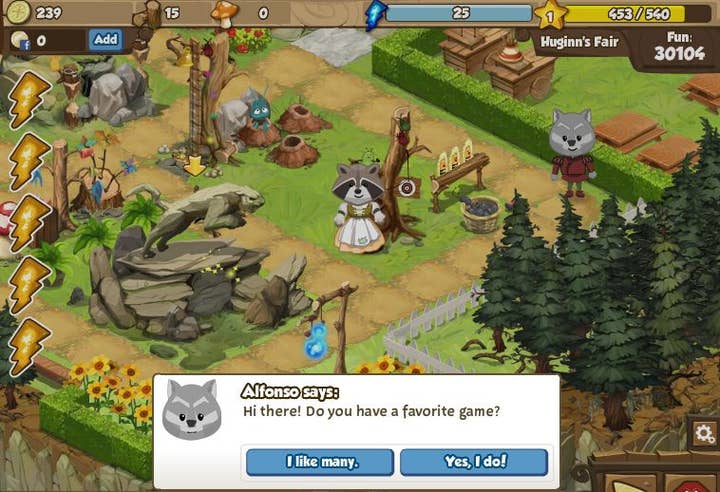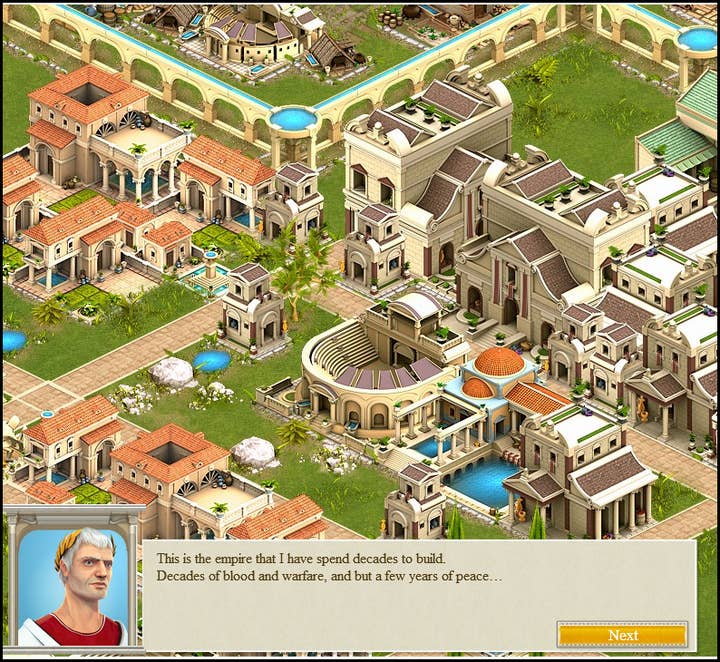New Wave: Jim Ying on 6Waves' new publishing focus
On shifting back to publishing and being able to take more risks in social and mobile gaming
The merger of 6Waves and Lolapps last year was planned to put the conglomorate into second place in the Facebook tables. However, the aquisition of PopCap by EA, and strong performances from King.com and Wooga have made that plan a more difficult prospect than it originally appeared.
Partly in response, the company has changed tack, dropping the LolApps part of the name and shifting focus back to publishing rather than development, alongside a continued growth in mobile markets. Fluidity is key in today's mercurial markets, so 6Waves' agility is likely a very sensible move, but what does it actually mean for day-to-day operations? GamesIndustry International sat down with Jim Ying, the company's SVP of publishing, to find out.
To a large degree it's actually pivoting back to what we started out and we were good at, so to give some history of the company it was founded in 2008 in Hong Kong by a bunch of ex-Yahoo guys. And when they started out it was initially just a couple of lightweight apps on Facebook, this is when it was the crazy, viral heyday of Facebook, when you could just throw something up and it would explode.
They built up a huge network of players and they tried doing some light development, but ultimately they saw that their expertise wasn't in games development, it really was understanding the platform elements and how to best leverage those for developers. So they pivoted into social games publishing in 2009, had a couple of big early wins working with Kabam with Watercooler, working with Camelot, 50 Cubes with Mall World and then two games out of China. One with Happy Elements, like Happy Farm, the Chinese version of the farm game, and then there's a Chinese version of the aquarium game.

So based on some of those early successes, really built up a social publishing business. At this point we've published probably around a hundred-plus social games. About 20 of them we've been able to get above one million monthly active players, between four and six we've been able to get above 5 million MAU, and our biggest game is actually Ravenwood Fair. This is before the merger, we got it up to 12 million monthly active players.
So the backbone of the company had always been on the publishing side. In the middle of last year, we had been working with the Lolapps guys for a while, and it was a solid relationship. They built great games, we kind of understood the promotion and marketing of these games. So we were like 'let's join forces.' I think ultimately at the end of the day what we didn't fully understand on the publishing side was that managing a development studio is a different beast than publishing.
Ultimately we just decided to focus more on the publishing side. Having a studio full of 70, 80, maybe even 90 people has significant costs in San Francisco. We knew that we were good at what we had been focused on before, publishing, and that there are other big opportunities for the company.
So one is definitely mobile publishing. So late last year we pivoted to mobile publishing, even though we're relatively new to this space we've already signed close to 35 to 40 games. We've launched a couple already, probably between 3 to 5, a big one that just came out is Strikefleet Omega from the guys at Harebrained Studios.
"Ultimately we just decided to focus more on the publishing side. Having a studio full of 70, 80, maybe even 90 people has significant costs in San Francisco."
So they had the Shadow Run IP, they raised a bunch of money through a Kickstarter. So we've got a couple of great titles in our portfolio, and then also we've got some exciting things going on in Asia.
In terms of publishing on Japanese social networks, Tencent in China, Nava in Korea, so looking at those opportunities relative to trying to fully grasp and manage the development side, just seemed like a better potential for us. And so that's why earlier in the year basically we moved back to the publishing side.
I think pretty much on the social side. On the mobile side we still do have a team in China. It was an acquisition, Smartron 5, but they're primarily focused on developing for the Asian social networks and mobile.
In terms of the differentiation relative to let's say, the Zyngas of the world, certainly that's one of the big ones. So if you're Zynga basically every game you go out with has to be a blockbuster that gets tens of millions of players. On our side I think it's more about singles or doubles, every so often there's triple or a home run. So I would say Ravenwood Fair, 12 million, that's pretty big. Mystery Manor, Astro Garden, right now they're all above 2, 3 million monthly active players, some of them are in the 1 million monthly active player range, so depending on who you are, to Zynga that's a sink, but to your average developer out there that's a pretty big deal.

So in terms of the overall portfolio that we're looking at we do have the ability to take larger risks with which developers we sign on. So if you look within our games we have very casual games that are kind of puzzles, bubble-ish games, but then we also have more of the hardcore -ish games. So we have a three game deal with Atari, all three of those games are relatively hardcore. We have a five game deal with BBC, those are probably more mid-range based on some of the IPs.
And then the rest of them are really scattered. So part of the beauty of the publishing role is that it is a shared risk with the developer. The developer focuses on the development cost and the creative vision, we focus on the distribution, marketing, localisation, and it's kind of shared risk, shared reward. So we don't need every single game to be a blockbuster. But if the game's stats are good, in terms of being a fun game that retains well and monetises well, we'll certainly be able to do a better job growing the game and attracting an audience for a game than a developer would be able to.
Pretty much. It's pretty standard at this point, it's a rev share that is tuned a little bit for each developer, depending on their heritage, their track record, depending on stats of previous games , but generally it's about the 50/50 range.
Yeah, so certainly, coming from the core side of the business, I spent a couple of years at Xbox, those deals are significantly more skewed towards the publisher. A lot of times the publisher is pulling in IP, the developer needs to earn out a large amount and sometimes they don't see any royalties at all. The way that we model our agreements really is a shared risk, shared reward. So the developers always hold on to all IP. We never push to get IP from a deal perspective, it's a game by game basis. So you sign one game for us, if it does well, then you'll naturally want to continue working with us.
So we have multiple partners who have worked with us on multiple games, Game Insight, Kabam, Starz, BBC, Atari, they've all signed multiple game deals because they have worked with us and seen what we've been able to do.
When you say middle ground?
"You don't need every single game to be a blockbuster. And so as long as the dev costs don't spike up on the mobile and social side, and I don't see why they would, there's always going to be a viable market."
The challenge on the console side is because there's such a big investment that players need to make. So right now you need to lay out $50 - $60. Unless you're a very hardcore fan you're going to limit the number of games you play to 4-6 maybe in a year. So you're only going to focus on the top blockbusters that your friends are talking about , the games that are spending tens of millions of dollars advertising. And from the developer standpoint the difference in cost in developing a medium game versus a high end game is not all that great.
A Halo or Call Of Duty is going to cost you tens of millions, or whatever, but generally the gap isn't that great. So you're still making a huge investment. Whereas on the social and mobile side... on the social side maybe you're tossing in three to five hundred thousand. If you're making a Zynga style game, sure, it's going to be a couple of million, but for your average independent developer it's still an order of magnitude less than a console game. On the mobile side even less so. Maybe with $150,000-350,000, you can make a decent game.
So developers have the freedom to take a lot more risks, making more games. It doesn't always have to be IP or a sequel and so if you're taking greater risks and you can make more games you're OK with having the smaller audience. You don't need every single game to be a blockbuster. And so as long as the dev costs don't spike up on the mobile and social side, and I don't see why they would, there's always going to be a viable market.
For the average consumer there's a hard gate to me playing a console game , I have to pay that 50 or 60 bucks. Whereas on the mobile or social side most of the games are free-to-play or maybe you're putting out 99 cents. So as a consumer I'm willing to try out a lot more games, and so because I'm going to try out a lot more games it provides a lot more of a marketplace for those medium games.
Definitely. It's only a matter of time. It's surprising how long it's taken, and I think that's largely because the fact that the consoles are ecosystems controlled by Sony, Nintendo and Microsoft, so if it were up to developers they would have brought these free-to-play games onto these platforms much earlier because there are players out there. Those players, it's a known quantity that they're willing to pay for these free-to-play games. It's just because these platform holders are so conservative, or they want to protect their existing businesses, that they're not letting developers get these games on. But it's moving in that direction.
Like on Xbox Live there are free-to-play, you can buy power ups. It's definitely not as prevalent as social and mobile, but it's only a matter of time before it moves in that direction. The same way MMOs have. There's maybe one or two companies out there who can say 'we're going to try to do $11.99, $14.99 for a monthly subscription.' Everyone else is going to have to move to free-to-play.
It blows my mind that there are still all these companies making console games, selling for $50 or $60 when the risks that you're taking are so high, the amount of money that you're putting in is so much, and the chance of a pay-off for the developer is not that great. Whereas on the social and mobile side you set aside a small team, make a couple of games. If you build the right game your in profit, it might not be console level, but the return on your investment is definitely going to be higher.
"Facebook is just a little bit more mature, it's not as mature as console, but it's not dying out. Unless for some reason all the people playing games on Facebook decide 'I'm not going to play Facebook games anymore,' which I don't think is going to happen."
Exactly. The team enjoys working on those kinds of projects because, towards the end when I left Xbox, and interacting with the development teams, if they're like 75 or more people, each individual is working on a tiny part of the game... I'm not saying you're a cog in the wheel but it's kind of moving in that direction whereas some of the mobile and social teams that we work with it's four or five people. Your ideas in the work that you're doing is instrumental to the final product, and you have a lot more buy-in and just in terms of interacting with developers you can tell they're a lot more excited about what they're working on.
I don't think it's dying. I think the initial gloss is wearing off. If you look at how much companies are still making on Facebook, so how much Zynga is still making, how much we're making, how much EA is making, how much Disney is making, it's still a solid chunk of money. And even though Facebook isn't growing as astronomically as they were before in terms of user base, there's still 700, 800 million people there, and there's a good chunk of them that's willing to play and pay. It's just a matter of the last two years everyone's been like 'aargh, Facebook is crazy' and that's transitioned a little bit to mobile. Everyone's seeing mobile as this huge opportunity, but it's only a matter of time before things start to settle down, the money doesn't grow as fast as it might have been.
There's still a huge opportunity in terms of smartphone penetration throughout the world, but it's just in an earlier life cycle stage than Facebook. So Facebook is just a little bit more mature, it's not as mature as console, but it's not dying out. Unless for some reason all the people playing games on Facebook decide 'I'm not going to play Facebook games anymore,' which I don't think is going to happen.
Possibly. A lot of people, especially on the core gaming side, argue games on Facebook never really were about being social. When they say they're social it's inviting a bunch of friends in so that I could build this building. But it's not like I'm interacting with them. There are games out there that are social, so some of the PvP based games, some of Kixeye's games, Kabam's games, those truly are social. But the vast majority are just, they use it as a marketing mechanism.
And in terms of single player, my belief is that it will get there. Here's my take, I don't know how many people share my feeling on this but at the end of the day Facebook has 800 million people. All the people who are playing on console, a lot of people who are playing on mobile, they're on Facebook. Why are they not playing single player games and more hardcore games?
It's either because there's not the right content or the consumers don't know about it. Because if they're already there, if someone can build a game experience for me on Facebook that is what I like to play, why would I not play there? I think it's just that a lot of core gamers have a bias against playing on Facebook, they haven't seen the full scope of the games on there. Or those developers or publishers haven't done as good a job marketing to those players on Facebook as they could.
Yeah, It's the same people, they're just playing on console, why wouldn't they play on Facebook if the right game came along?
"We're not going to help you develop your game. We're not going to subsidise development. What we will commit to is spending this $100k on marketing."
Pretty well! The big thing for independent developers is discoverability, on the App Store and Android. There are a tonne of developers making games out there and if you look at the level of quality of some of these games, they're pretty high. It's a real shame when some of these developers don't have the marketing budget, they don't have the existing network or the know-how and they can't reach big numbers. That's kind of where our guarantee and overall publishing methodology comes through.
We're not going to help you develop your game. We're not going to subsidise development. What we will commit to is spending this $100k on marketing. If we don't spend that $100K in two months, then you can have all the users that we've sent in, all the money we have spent, back - walk away with it. I'm biased, but I think that's a pretty fair deal.
There are two ways to look at it. Where does that specific guarantee go and where are we spending money generally. That specific guarantee all goes directly towards CPI marketing. That's using partners like Tapjoy, Flurry, Playhaven - basically serving ads through these vendors. In terms of other marketing that don't come from that $100K, there are PR campaigns, contacting blogs and advertising there, cross-promotion from our existing network. But that $100K is specifically for you.

